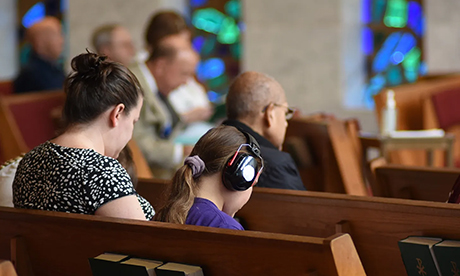Nativity Catholic Church in Burke, Virginia, launched its first monthly “sensory Mass” on August 11, drawing a full congregation to what is typically the parish’s least-attended Sunday service.
The 1pm Mass, designed to accommodate neurodiverse Catholics, featured dimmed lighting, quiet hymns and a range of sensory tools to assist attendees. Volunteers in gray T-shirts greeted Mass-goers, offering special arrangements and access to interactive Mass binders and tactile self-regulation aids.
At the beginning of the Mass Fr Bob Cilinski, Nativity’s pastor, highlighted inclusivity.
“We gather as God’s children, all of us.”
The liturgy included minor modifications such as recited rather than sung responses and a visually-aided homily.
The initiative aims to address the challenges faced by individuals with developmental disabilities, particularly those with sensory-processing issues.
Studies have shown that autistic children are nearly twice as likely never to attend church services compared to children without chronic health conditions.
Tracey Hulen, a parishioner and education consultant, organised the sensory liturgy alongside Joyce Kelly and Alison Fram, directors of the parish’s Special Religious Development programme and young adult ministries respectively.
In preparation for the Mass, the team provided sensory systems training to the parish priests.
Jeannine Brown attended with her 15-year-old son who has multiple neurodevelopmental diagnoses. She expressed appreciation for the arrangements that were made.
“He said ‘Well, sign me up'” Brown reported of her son’s enthusiasm for future sensory Masses.
Charleen Katra, executive director of the National Catholic Partnership on Disability, noted that sensory-friendly Masses have grown in popularity since the late ’90s.
The organisation currently offers an online course about starting a sensory Mass.
Fr Matthew Schneider, an autistic priest, maintains a directory of regular sensory Masses across the US and Canada.
He advocates for at least one sensory Mass in every city to improve accessibility and foster community among autistic Catholics.
